|
|
|
Sort Order |
|
|
|
Items / Page
|
|
|
|
|
|
|
| Srl | Item |
| 1 |
ID:
145641
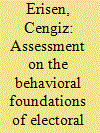

|
|
|
|
|
| Summary/Abstract |
Turkish politics has overcome several challenges in order to reach a situation with less political uncertainty. Among several issues, voter behavior in the two recent general elections in 2015 is a major topic of interest. In this think-piece, I discuss the behavioral indicators of vote choice and political judgments between the two 2015 elections. To that end, I first explore the context of public polarization before introducing the behavioral approaches to explain voter behavior. I use nationally representative survey data in order to make descriptive inferences that shed light on the unexpected change in electoral behavior.
|
|
|
|
|
|
|
|
|
|
|
|
|
|
|
|
| 2 |
ID:
190310
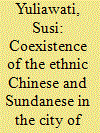

|
|
|
|
|
| Summary/Abstract |
There has been much discussion of Indonesia’s changing policies toward ethnic Chinese and the phenomenon of anti-Chinese sentiment. However, cases where Chinese Indonesians and native Indonesians live peacefully side by side are worth investigating. This paper explores the notable tolerance and maintenance of a relatively peaceful coexistence between the Sundanese and Chinese in areas with peaceful relations of long standing between their communities. In particular, we investigate the area called Kampung Toleransi (Kampong of Tolerance), an officially designated name of the City Government of Bandung in 2018. The results show that Kampung Toleransi is a symbol of a religious and ethnic harmony. We argue that it is self-evident that the two ethnicities are living harmoniously due to general tolerance of religious and ethnic differences. By maintaining peaceful coexistence, the two communities obtain mutual benefit.
|
|
|
|
|
|
|
|
|
|
|
|
|
|
|
|
| 3 |
ID:
141057
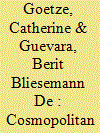

|
|
|
|
|
| Summary/Abstract |
Cosmopolitanism has been argued to be a crucial component of peacebuilding, both with regard to its aims as well as its staff. In a universalist-liberal understanding of the concept, cosmopolitanism is the optimal mind frame for peacebuilders to rebuild post-war societies, due to the tolerance, justice-orientation, and neutrality regarding local cleavages that the concept entails in theory. This article argues, however, that cosmopolitanism cannot be understood outside of its social context, therefore requiring sociological empirical analyses. Drawing on three such sociological concepts, namely elite, glocal, and localisable cosmopolitanism, the article analyses empirically through interviews with peacebuilders in Kosovo whether and in which form these international civil servants display cosmopolitan worldviews. The study concludes that while in theory the localisable variant would be best suited to contribute to locally sensitive, emancipatory peacebuilding, this form of cosmopolitanism is absent in practice. Given the novel, exploratory character of this analysis of hitherto uncharted terrain, the article also discusses in detail how the findings were obtained and in how far they are generalisable.
|
|
|
|
|
|
|
|
|
|
|
|
|
|
|
|
| 4 |
ID:
078483
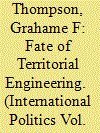

|
|
|
|
|
| Publication |
2007.
|
| Summary/Abstract |
Does there exist a genuine threat to the continuation of a broadly liberal international (and domestic) order, driven by the re-emergence of religious and secular fundamentalisms? This article assesses this issue in the context of first the rise of territorial power and then its fate in a period of globalization and the revival of religious intolerance. The twin concepts of sovereign-power and bio-power are deployed to investigate the emergence of territorial engineering in the 17th century. A key feature of modern fundamentalisms is that they promote and trade on the deterritorialization of social, political, cultural and economic activity. It is argued that this is a manifestation of a new form of 'spirited martial power'. The risks associated with these developments should not be over-exaggerated but they exist nonetheless. If this is the case, the problem becomes one of how to re-territorialize the activities and disputes engendered by this reappearance and re-emergence of spirited martial power in the international system, with all its attendant links to religious fundamentalisms. Here the argument is that this requires a re-examination of the nature of international borders, and indeed a re-emphasis on their role, not just in respect to containing disorder and restoring the capacity for governance, but also as a way of re-configuring international toleration and of righting a wrong
|
|
|
|
|
|
|
|
|
|
|
|
|
|
|
|
| 5 |
ID:
178046
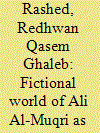

|
|
|
|
|
| Summary/Abstract |
This study aims at highlighting the artistic and intellectual vision of Ali Al-Muqri, a prominent contemporary Yemeni novelist, in The Handsome Jew, a narrative that marks a sharp departure from the works of his contemporaries in terms of its themes, technical devices, and discursive strategies. Much has been written about the relation between Muslims and Jews in the world literature. However, most, if not all, have a masculine stamp. The norm has been reversed here, Fatima, an educated Muslim woman, loves Salem, the Jew, and marries him. In contrast to the derogatory image of the Jew in literature, Salem seems open-minded and very humane. It is hypothesized that all religions are subject to interpretation according to human needs and that all religions are a source of union, not separation. Building on an eclectic theoretical framework with the analytical method, this study analyzes The Handsome Jew that is still incarcerated within the local Yemeni linguistic and cultural barrier and aims to locate the Yemeni narrative in the realm of Arabic and world literature. The conclusions of the study are as follows: despite different religions and cultures, there is a possibility for coexistence and establishing social relationships, as it happened with Fatima and Salem, who introduce a kind of sublime human reconciliation that has not touched the sacred belief of both. Learning the other’s culture and reading freely, away from the preceding and inherited views, is essential for a healthy society. It would make Muslims love the Jews and would make the Jews love the Muslims. Love is a natural humanistic energy that challenges human-made cultural barriers.
|
|
|
|
|
|
|
|
|
|
|
|
|
|
|
|
| 6 |
ID:
131481
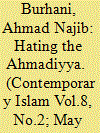

|
|
|
|
|
| Publication |
2014.
|
| Summary/Abstract |
Religious diversity and pluralism is commonly understood within the context of the relation between various religious traditions, not within a single religious tradition. This limitation of the boundary of religious pluralism could overlook the fact that conflict within a single tradition can be bitterer and more disastrous than conflict with other religions. In the last decade, for instance, the Ahmadis in Indonesia have become victims of constant attacks. This article, therefore, intends to study the place of the Ahmadiyya in the context of religious pluralism in Indonesia by answering the following questions: Why was the treatment of the Ahmadis in recent years by Muslims more vitriolic than their treatment of non-Muslims? What is the nature and quality of life for people who have been excluded from a 'normal' religious identity in a time when religious attachment is a necessary fact for that society? Why did the attacks on the Ahmadiyya occur in the present regime, not during the past authoritarian one? This article argues that the charge of heresy issued by Muslim institutions put the Ahmadiyya in liminal status; they are in the zone of indistinction between Muslims and non-Muslims. This makes them vulnerable to persecution since they have been deprived of their rights as Muslims, while their rights as non-Muslims are still suspended. Non-Muslims, particularly ahl al-kit?b (People of the Book), have been accepted theologically in Muslim society, but there is no place of tolerance for heretics. The rise of intolerance in Indonesia parallels the rise of religious conservatism after the fall of Suharto in 1998.
|
|
|
|
|
|
|
|
|
|
|
|
|
|
|
|
| 7 |
ID:
073489
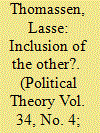

|
|
|
|
|
| Publication |
2006.
|
| Summary/Abstract |
In his most recent work, Jürgen Habermas has proposed a deliberative account of tolerance where the norms of tolerance-including the threshold of tolerance and the norms regulating the relationship between the tolerating and the tolerated parties-are the outcomes of deliberations among the citizens affected by the norms. He thinks that in this way, the threshold of tolerance can be rationalized and the relationship between tolerating and tolerated will rest on the symmetrical relations of public deliberations. In this essay, and inspired by Jacques Derrida's work on the concept of hospitality, I propose a deconstructive reading of Habermas's writings on tolerance. I argue that Habermas is ultimately unable to provide a rational foundation for tolerance and that his conception of tolerance encounters the same problems he is trying to avoid, namely, the contingency of the threshold of tolerance and a paternalistic relation between tolerating and tolerated. Yet, contra Habermas, the deconstruction of tolerance does not result in its destruction and does not force us to give up on the concept and practice of tolerance.
|
|
|
|
|
|
|
|
|
|
|
|
|
|
|
|
| 8 |
ID:
123496


|
|
|
|
|
| Publication |
2013.
|
| Summary/Abstract |
This paper directly challenges the persisting argument that in the host-(uninvited) guest relationship of Kimberley coastal tourism in Australia's far northwest, Traditional Owners (the hosts) have a pedagogic responsibility to first educate the tourism industry (the guests) of their impacts on them in order to facilitate culturally appropriate and sustainable tourism experiences. We contend that such an argument reflects a deeply entrenched context of erasure and power imbalance between Australian Aboriginal and non-Aboriginal people. We highlight, using three decades of public records, the fact that government and industry have ignored and continue to ignore knowledge and learning shared by Kimberley Aboriginal peoples in attempts to rectify serious issues of cultural impacts and risks to visitors arising from unsanctioned tourism activities on Traditional Owners' land and sea country. We argue for the possibility of tourism operating in a mutually satisfactory hybrid space in which acknowledgement, tolerance and respect discharges the need for understanding different ontologies that operate within that space but provides the potential for learning. Using Bourdieu's notion of transformative practice, we propose that the development of such a hybrid space could transform the problem of unsanctioned tourism access to the Kimberley coast into an iteration that could facilitate its taming and thus a shift towards sustainable practices based on mutual recognition and respect.
|
|
|
|
|
|
|
|
|
|
|
|
|
|
|
|
| 9 |
ID:
130991


|
|
|
|
|
| Publication |
2014.
|
| Summary/Abstract |
When US President Barack Obama publicly addressed the data mining and analysis activities of the National Security Agency (NSA), he appealed to a familiar sense of the weighing of the countervailing forces of security and privacy. "The people at the NSA don't have an interest in doing anything other than making sure that where we can prevent a terrorist attack, where we can get information ahead of time, we can carry out that critical task," he stated. "Others may have different ideas," he suggested, about the balance between "the information we can get" and the "encroachments on privacy" that might be incurred (Obama 2013). In many ways, conventional calculations of security weigh the probability and likelihood of a future threat on the basis of information gathered on a distribution of events in the past. Obama's sense of a trading-off of security and privacy shares this sense of a calculation of the tolerance for the gathering of data on past events in order to prevent threats in the future. In fact, though, the very NSA programs he is addressing precisely confound the weighing of probable threat, and the conventions of security and privacy that adhere to strict probabilistic reasoning. The contemporary mining and analysis of data for security purposes invites novel forms of inferential reasoning such that even the least probable elements can be incorporated and acted upon. I have elsewhere described these elements of possible associations, links, and threats as "data derivatives" (Amoore 2011) that are decoupled from underlying values and do not meaningfully belong to an identifiable subject. The analysis of data derivatives for security poses significant difficulties for the idea of a data subject with a recognizable body of rights to privacy, to liberty, and to justice.
Consider, for example, two years before the controversies surrounding NSA and the PRISM program, when the US Director of National Intelligence, James Clapper, testified before the joint hearing of committees on the virtues of the algorithmic piecing together of fragments of data:
|
|
|
|
|
|
|
|
|
|
|
|
|
|
|
|
| 10 |
ID:
161625
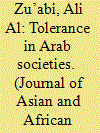

|
|
|
|
|
| Summary/Abstract |
The study examines the factors that have contributed to shaping the crisis in the culture of tolerance and moderation in Arab societies and its limits. I look at the dilemmas and risks necessitated by the problematic issues surrounding tolerance in contemporary Arab societies. I present a brief theoretical framing of the concept of ‘tolerance’ and a look at its manifestations in the structure of Arab societies. I also examine the variables shaping the content, meaning, and philosophy of tolerance in the structure of contemporary societies at large and of Arab societies in particular. The paper suggests that political, economic, social, and structural transformations have negatively affected Arab societies, which have then contributed to the culture of tolerance in Arab communities.
|
|
|
|
|
|
|
|
|
|
|
|
|
|
|
|
| 11 |
ID:
105058


|
|
|
| 12 |
ID:
102597
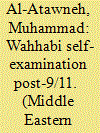

|
|
|
|
|
| Publication |
2011.
|
| Summary/Abstract |
Saudi Arabia found itself under an unflattering spotlight in the wake of the events of 9/11, perhaps more than any other country in the Middle East. The fact that 15 of the 19 suicide skyjackers were Saudi citizens provoked an avalanche of criticism in the West as well as in some parts of the Islamic and Arab world against Saudi religious beliefs, rulers, social customs, and school curricula. This article traces the Wahhabi Post-9/11 ideological "self-examination" of relationships with non-Wahhabis. Emphasis will be placed on the current Wahhabi perceptions of the fundamental terms of "other" and "otherness" that are most likely to affect relationships between the Wahhabis and other cultures and religious groups. I argue that post-9/11 Wahhabi Islam acknowledges the problematic nature of its traditional perception of the 'other' and, therefore, is making significant and unprecedented efforts to reformulate and redefine religious doctrines, such as jihad, tolerance, interfaith dialogue and so forth.
|
|
|
|
|
|
|
|
|
|
|
|
|
|
|
|
| 13 |
ID:
193624
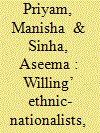

|
|
|
|
|
| Summary/Abstract |
Using evidence regarding the consolidation of Hindu nationalism in India we put forward new ethnographic data about the variety of popular support for a Hindutva project and a new framework that proposes an interactive theory of social identity. This framework helps us understand how Hindu nationalism becomes embedded in society. We assert that Hindu nationalism in India could be fruitfully analysed by focusing on the processes through which ideas of exclusive nationalism spread among ordinary middle-class people and are expressed in micro-level psychological changes at the individual level. The consolidation of Hindu nationalism in India is being authored not only by parties or the state, but also by societal actors, specifically, ordinary middle-class Indians. Hindu nationalism has been spreading in micro-public spheres in a time of apparent peace and between elections, and with the participation of willing supporters. Building on our fieldwork and research in psychology and history, our conversations have also helped us to identify profiles of different types of nationalists, which we categorize as willing ethnic-nationalists, hardliners, bystanders, and moderates. Further, we suggest the need to focus on inter-linked micro-level mechanisms such as diffusion and emulation of Hindu-centric beliefs and ideas, mobilization by hardliners and organizations, and impunity resulting from protection by state agencies, which helps to create willing ethnic-nationalists and sustains Hindu nationalism. Evidence regarding social interactions from a variety of survey organizations concurs with our findings and our ethnographic material allows us to delve deeper into varieties of Hindu nationalist support across diverse ordinary people.
|
|
|
|
|
|
|
|
|
|
|
|
|
|
|
|
|
|
|
|
|